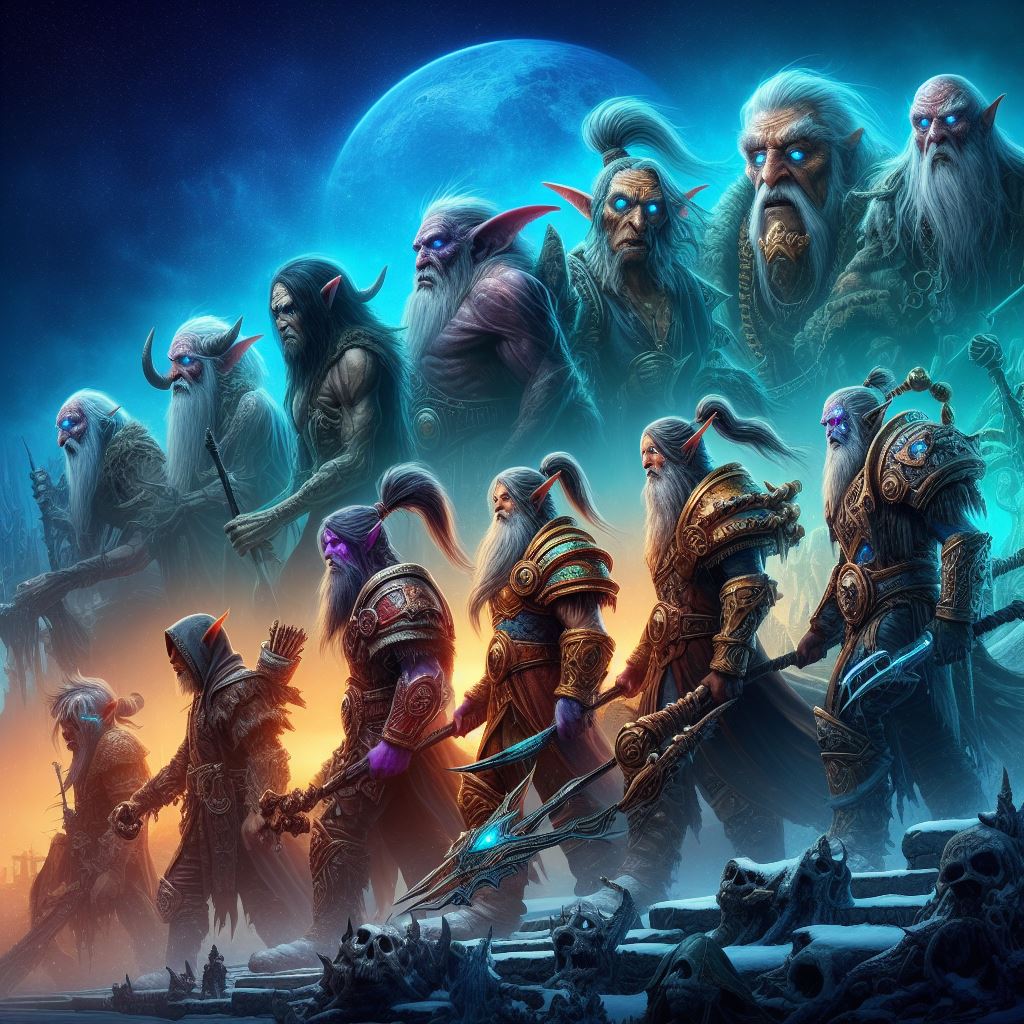Introduction to MMORPGs and ‘World of Warcraft’
Massively Multiplayer Online Role-Playing Games (MMORPGs) have redefined the way we play, interact, and even perceive video games. Among these, ‘World of Warcraft’ (WoW) stands out not just as a game but as a cultural phenomenon that has shaped the genre. Launched by Blizzard Entertainment in 2004, WoW brought the fantasy world of Azeroth to life, offering an immersive experience that has attracted millions of players worldwide.

Historical Context and WoW’s Launch
Before WoW’s introduction, MMORPGs were a niche market with games like ‘EverQuest’ and ‘Ultima Online’ setting the foundational mechanics. WoW’s launch was not merely an addition to this genre but a revolutionary approach that simplified gameplay, making it accessible to a broader audience. Its immediate success was driven by its ability to blend an engaging storyline with a dynamic game environment, which was a significant departure from the more complex systems of its predecessors.
Game Mechanics and Innovations
WoW introduced a series of gameplay innovations that became benchmarks for future MMORPGs. Its quest system, for instance, offered structured, narrative-driven objectives that guided players through the game, providing a coherent sense of progression and purpose. Moreover, WoW’s user interface was exceptionally user-friendly, setting a standard for future designs.
Storytelling and World-Building in WoW
A critical aspect of WoW’s success lies in its storytelling and world-building. Each character, quest, and location in Azeroth has a story that contributes to a larger, intricate tapestry. This narrative depth transformed gaming from a mere pastime into an interactive storytelling medium, where players could become part of the narrative fabric.
Community and Culture
WoW is more than a game; it’s a community. It fostered a global network of players who not only played together but also created lasting relationships, some even transcending the digital realm. The culture around WoW—encompassing fan conventions, forums, and fan art—has been influential in shaping an inclusive gaming community.
Economic Impact of WoW
Economically, WoW has been a juggernaut. Its subscription-based model demonstrated significant revenue potential for online games, influencing how developers monetize MMORPGs. The game has generated billions in revenue, not only through game time but also through merchandise, expansions, and other media.
Major Updates and Expansions
WoW has kept its gameplay fresh and engaging with regular updates and expansions. Each expansion pack not only extended the world of Azeroth but also introduced new features, classes, and mechanics, keeping the community engaged and continually attracting new players.
This article will continue to explore WoW’s comparative analysis with other MMORPGs, its technological impacts, influence on other media, and the social implications it holds. Stay tuned as we delve deeper into the profound impact WoW has had on the gaming culture and its future prospects in the evolving landscape of MMORPGs.
Comparative Analysis: Before and After WoW
Prior to the launch of WoW, MMORPGs like ‘EverQuest’ and ‘RuneScape’ offered complex and rewarding experiences but often lacked mass appeal due to their steep learning curves and demanding gameplay. WoW changed the landscape by streamlining many of these complex elements, making the genre more accessible and appealing to a broader audience. Its success prompted a shift in how games were designed, focusing more on the player experience and accessibility. As a result, subsequent MMORPGs have often sought to balance complexity and accessibility, drawing lessons from WoW’s successful formula.
Technological Advancements Inspired by WoW
The technological demands of hosting millions of players in a seamless and persistent world led to significant advancements in server technology and data handling. WoW’s need for stable, continuous online environments pushed improvements in cloud computing and data infrastructure, which have benefitted broader technology ecosystems beyond gaming. These innovations have not only supported larger player bases but also facilitated the development of new online services and applications.
WoW’s Influence on Other Media
WoW’s influence extends beyond the realm of video games into other media, including books, comics, and a feature film. These expansions into various forms of storytelling have not only enriched the game’s lore but also demonstrated the potential for interactive game worlds to contribute to broader narratives. Additionally, WoW has been featured in television shows and has had a significant impact on internet culture, inspiring memes, popular internet slang, and viral videos.
Social Implications of WoW
The social dynamics within WoW are a microcosm of broader societal interactions, with its own cultures, economies, and social structures. Players engage in activities that mirror real-world behaviors, including commerce, cooperation, and conflict. This virtual interaction provides insights into social behavior and group dynamics, offering a unique perspective on human interaction in digital spaces.
Challenges and Controversies
Like any significant cultural phenomenon, WoW has faced its share of challenges and controversies. These include issues related to game balance, the management of its player base, and the handling of in-game economies. Additionally, the game has been at the center of discussions regarding internet addiction and the psychological impacts of prolonged gaming. Blizzard has navigated these challenges by evolving their game design and community management strategies to ensure a sustainable and enjoyable environment for all players.

The Future of WoW and MMORPGs
Looking to the future, WoW continues to evolve. With new expansions and updates, Blizzard aims to keep the content fresh and engaging. The ongoing development suggests a commitment to adapting to new gaming trends and technologies, such as augmented reality (AR) and virtual reality (VR), which could redefine MMORPGs once again. The enduring success of WoW indicates that the MMORPG genre will continue to thrive, adapting to new technological advances and changing player expectations.
In conclusion, ‘World of Warcraft’ has significantly shaped the MMORPG genre and gaming culture at large. Its impact on gaming mechanics, storytelling, community building, and technological advancements has set standards that are still influential today. As WoW continues to adapt and evolve, it remains a central figure in the discussion about the future of online gaming and its potential to influence other cultural and media landscapes.
FAQs About ‘World of Warcraft’ and Its Cultural Impact
- How has ‘World of Warcraft’ influenced the development of other MMORPGs?
- What are some of the major social dynamics that can be observed in WoW?
- How has WoW’s storytelling evolved with its expansions?
- What technological advancements were propelled by WoW’s needs?
- What are the psychological impacts of prolonged gaming as seen with WoW?
- What can we expect from the future of MMORPGs influenced by WoW?
Conclusion
‘World of Warcraft’ is not just a game; it’s a pioneering force in the MMORPG genre that has left an indelible mark on gaming culture. As we continue to witness its evolution, WoW remains a testament to the potential of virtual worlds to shape real-world interactions and cultural narratives.